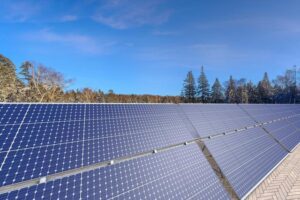Solar panels are devices that convert solar energy into electricity, commonly used to provide household power and commercial purposes. To ensure that solar panel manufacturers – Huanqi solar panels_ Single crystal solar panels_ Polycrystalline solar panels_ Sunpower solar panels_ Flexible solar panels_ Solar folding bag_ Customization of solar panels – The durability of solar panels in different working environments in industries such as monitoring, IoT, aviation, electrical appliances, transportation, and communication requires multiple tests during the production process to verify their performance and quality. Among them, vibration testing is one of the most important tests.

1、 What is solar panel vibration testing?
Vibration testing refers to the process of detecting the vibration generated by solar panels under external forces such as climate change and self motion. Due to the fact that solar panels are mostly installed on roofs and other heights, they need to face harsh weather conditions such as wind and rain, as well as external forces such as earthquakes, vehicle traffic, and mechanical operation. Therefore, before manufacturing solar panels, vibration testing is required to evaluate whether they are resistant to these external factors and ensure their stability and longevity.
2、 The purpose of solar panel vibration testing
The main purposes of solar panel vibration testing are as follows:
Identify the vibration characteristics of solar panels. Solar panels generate specific vibration responses in different vibration directions and frequencies. Vibration testing can detect the performance of solar panels under different vibration conditions and identify parameters such as stability, sealing, and safety.
Evaluate the durability of solar panels. Vibration testing can simulate the external vibrations and the magnitude and intensity of vibrations experienced by solar panels under long-term working conditions, in order to determine whether the solar panels are strong enough to withstand these external forces and ensure normal operation.
Improve the safety performance of solar panels. In some cases, such as earthquakes, tornadoes, rainstorm storms and other climatic and natural factors, the solar panel needs to withstand a certain amount of vibration force to ensure its integrity and life. Vibration testing can ensure that the solar panel can withstand and adapt to these special circumstances.
Assist in optimizing the design of solar panels. The life cycle, power output, and structural design of solar panels are closely related to the vibration response of solar panels. Vibration test results can help manufacturers optimize design to improve the performance and competitiveness of solar panels.
3、 Method for vibration testing of solar panels
There are usually two main methods used for vibration testing of solar panels: simulated vibration testing and actual vibration testing.
Simulated vibration testing. This method uses machines or equipment to simulate the vibration of solar panels under different conditions, such as vibration tables, accelerometers, actuators, etc. These devices can apply specific accelerations and frequencies to solar panels and measure response information for analysis. Simulated vibration testing can be repeated and multiple parameters can be added, including radial or axial vibration, horizontal or vertical vibration, high-temperature micro dynamic load fatigue, etc.
Actual vibration testing. Actual vibration testing refers to the installation of solar panels directly on a moving vehicle or an object that combines with other physical bending processes. By testing the response of solar panels in actual environments, such as exposed roofs in wind and rain and flying saucer field testing, more realistic data can be obtained.
The implementation of vibration testing for solar panels requires relevant standards issued by the manufacturer’s country, and is carried out and recorded in accordance with the FBT (Functional Testing) and quality verification procedures for interconnection engineering. This can ensure the objectivity and reliability of vibration test results, and optimize the test results to ensure the quality and performance of solar panels.
Therefore, solar vibration testing is an important part of the manufacturing process of solar panels, with the aim of evaluating the durability and working stability of products and improving their safety performance. Vibration testing can evaluate the vibration characteristics, durability, and safety performance of solar panels through simulation and actual environmental vibration conditions, thereby optimizing design and improving production processes. For the future of solar energy technology, verifying its sustainability, stability and scalability to meet the World energy resources’s energy needs will play a crucial role.
If you want to know more about solar panels, please contact us, the solar panel manufacturer – Huanqi Technology (Shenzhen) Co., Ltd.




